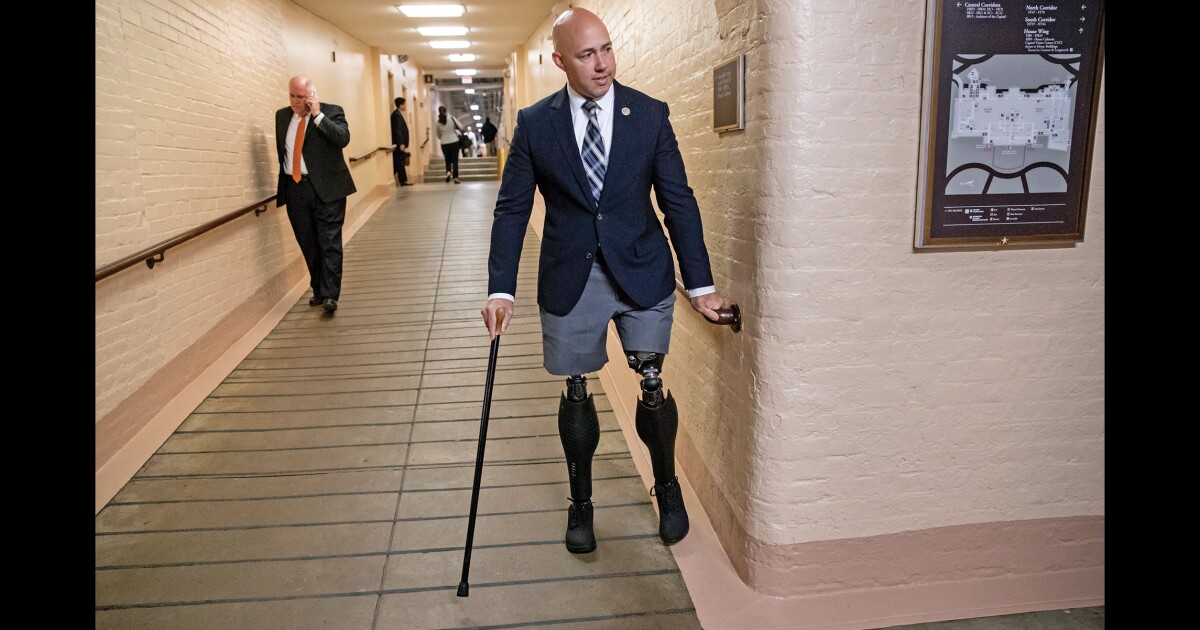

Rep. Brian Mast (R-FL) said he is resolute in his decision to wear his military uniform from his service in the Israeli Defense Forces on Capitol Hill. Mast said he made the decision following his colleague Rep. Rashida Tlaib (D-MI) hoisting the Palestinian flag outside her office and the former Hamas chief Khaled Mashal calling for a day of rage in support of the Palestinians — both happening after a surprise attack by Hamas terrorists killed thousands of Israelis on Oct. 7.
“I’m going to make it known exactly where I have stood and where exactly it is that I stand in this moment,” Mast said in an interview with the Washington Examiner magazine.
IVY LEAGUE SCHOOLS LOSE DONORS AMID ANTI-ISRAEL STUDENT ACTIVISM
“I always stand for America, No. 1,” explained Mast, who represents Florida’s 21st Congressional District. “But I have stood alongside Israel proudly. And I will stand alongside them again. We share values, we share love for the same things in this world, and we share a commitment to defend those things. And that’s exactly what makes them our greatest friend and ally.”
Before volunteering with the IDF, Mast lost both of his legs and a finger from a hidden improvised explosive device he encountered while serving as an Army bomb disposal technician in Afghanistan during Operation Enduring Freedom. Of Tlaib, Mast noted, “That might be her freedom of speech to put up an Arab Nazi flag into the Capitol, in her office building. But it was my freedom of speech to say, ‘This is where I’ve stood, and this is where I stand now. And you know where to find me.’”
Mast said he has not spoken to Tlaib since he wore his uniform. However, he has watched her dodge reporters’ questions in the halls, saying, “I’ve seen the video of her running away from answering for the atrocities, hiding behind whatever staff was with her, and hiding from answering for these atrocities and remaining silent.”
Mast said he has no problem answering any questions reporters may ask him about his decision or his viewpoints on what is happening in Israel, beginning with the suggestion of proportionality in Israel’s response to the attacks. “That suggestion is idiotic,” he said bluntly, adding that it is a level of appeasement to say Israel or America needs to have a “proportional” response to terrorism.
“No, we don’t,” he emphasized. “There is a threat in the world that is evil … and if we don’t have the commitment to eliminate that, especially in the face of what has been shown by them, we are appeasing it. And there’s no reason for proportionality for it.”
Mast said to imagine if the United States said after Pearl Harbor, “We need to be proportional and exercise restraint.” “You have to eliminate the threat,” Mast said. “Not to scare the threat, not to partially eliminate the threat. … You can’t buy them, you can’t give them more land, you can’t give them more money. You have to destroy the threat with the same resolve that you would destroy Nazis.”
Mast is a rarity in the halls of Congress: The Grand Rapids, Michigan, native served in both the U.S. Army and the IDF before seeking office in 2018, making him the only member to do so. He said he always knew growing up that he wanted to serve his country in the same way his father and his father’s father served.
Speaking on the explosion that claimed both his legs, Mast said he had no memory of what happened to him for several weeks after the initial blast. “I remember trying to wipe all of the dirt and dust and soot of the explosives out of my eyes that had just been blasted up into my face, into this mushroom cloud. I can remember my guys — I still had my radio device in my ear — and I can remember them radioing up to the assets in the sky, telling them exactly what happened. “EOD is hit, EOD is down,” he recalled.
He said he remembers hearing it all play out, the tourniquets being placed on what was left of each of his legs and what was left of his left arm and wrenching them down and being transported into a medevac helicopter and seeing men saluting him.
“And then it all went dark for weeks,” he said.
By the time his father was able to see him, Mast admitted he wasn’t in a good place. Yet his father being his father, Mast said, he egged him on to think about figuring out what his purpose was — “and to get at it.”
Mast medically retired from the U.S. Army following 12 years of service, earning the Bronze Star Medal, the Army Commendation Medal for Valor, the Purple Heart, and the Defense Meritorious Service Medal. Following that talk with his father, he decided his immediate purpose would begin with finishing that college degree he never completed.
It was when he was at Harvard University in the summer of 2014, pursuing a bachelor’s degree in economics, that his calling to volunteer for the IDF came to him. “I was with my then-pregnant wife and two young children walking at Boston Common when several men who had participated in the anti-Israel protest going on by the Common tried to pick a fight with me,” he said.
“It wasn’t hard to figure out I was former U.S. military. I had an Army Ranger baseball cap on, and my prosthetics were clearly visible beneath my shorts. When we got home, I told Brianna I was going to find a way to really support Israel,” he said of the conversation he had with his wife.
“It is not a leap to say the people who hate Israel aren’t that far removed from hating the United States,” Mast said.
Mast recalled the anger that led to his resolve to find a way to do something meaningful to help Israel. “I was hot, I was upset, I was pissed off, and I was also determined that it was going to be something more than tweeting or posting on Facebook. I knew I would do something,” he said.
Mast spent the next few months calling the consulates, embassies, and Israel support groups. “Ultimately, they said you can volunteer with the military, and they weren’t sure what to make of it because I don’t know that they’ve ever had anybody that disabled or handicapped to volunteer that way,” he said.
Mast pushed their doubts aside. “I’m very able-bodied. There’s not much that I can’t do. It takes me a little bit more time. But if you hear ‘bilateral amputee,’ you probably don’t really know exactly what it is what they’re capable of just by hearing that in terms of profile. And so, they said, ‘OK, we’ll have you. Come, volunteer, join us.’ And that’s what I did. That’s how I found my way to Israel,” he said.
Mast found his experiences both life-affirming and life-changing. “Just incredibly positive, from getting to know the people to getting to understand military operations there to getting to understand the scope of the threat that they face, whether from rocket attacks from the Gaza Strip or the narrow strip of land that Israel is and how easy it would be to bisect, whether from east to west or north to south,” he said.
CLICK HERE TO READ MORE FROM THE WASHINGTON EXAMINER
He was also struck by the fact that every family there is affected by military service. “When you’re sitting at a Shabbat dinner, everybody’s waiting for a son, a daughter, a grandson, a granddaughter, a niece, a nephew, a whatever to come home from service.”
He also learned a lot while there about Hamas. “Indiscriminate. That’s the word that I would use. It’s not about seeking a military entity. It’s about seeking a Jewish target, whether the target is a military soldier, whether the target is a grandmother or a grandfather, whether the target is [in] high school or elementary school or younger. Indiscriminate killing is the target.”




